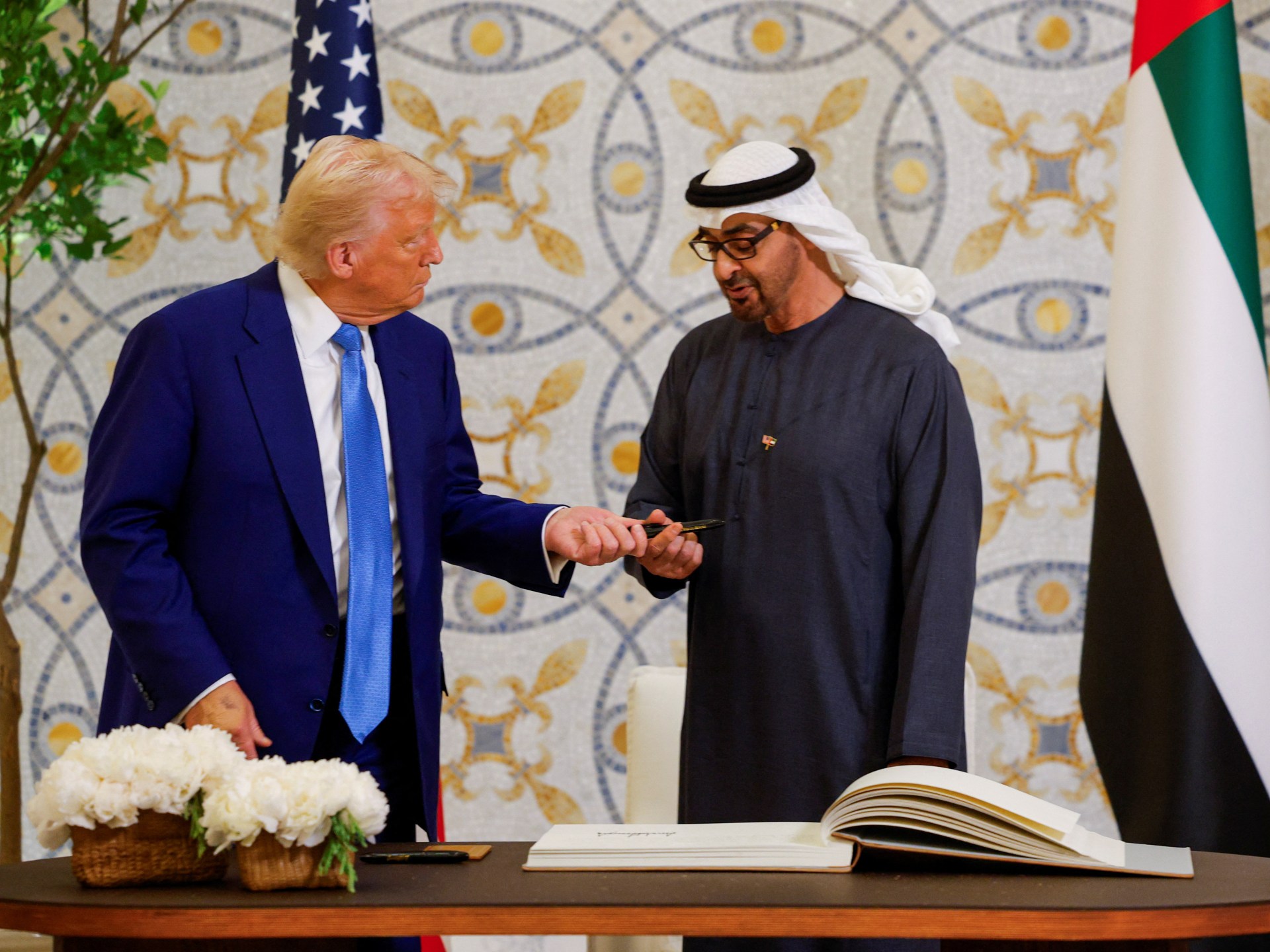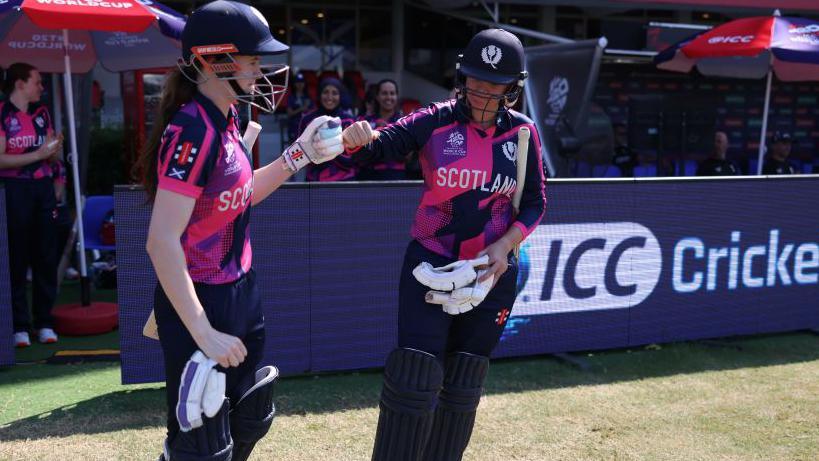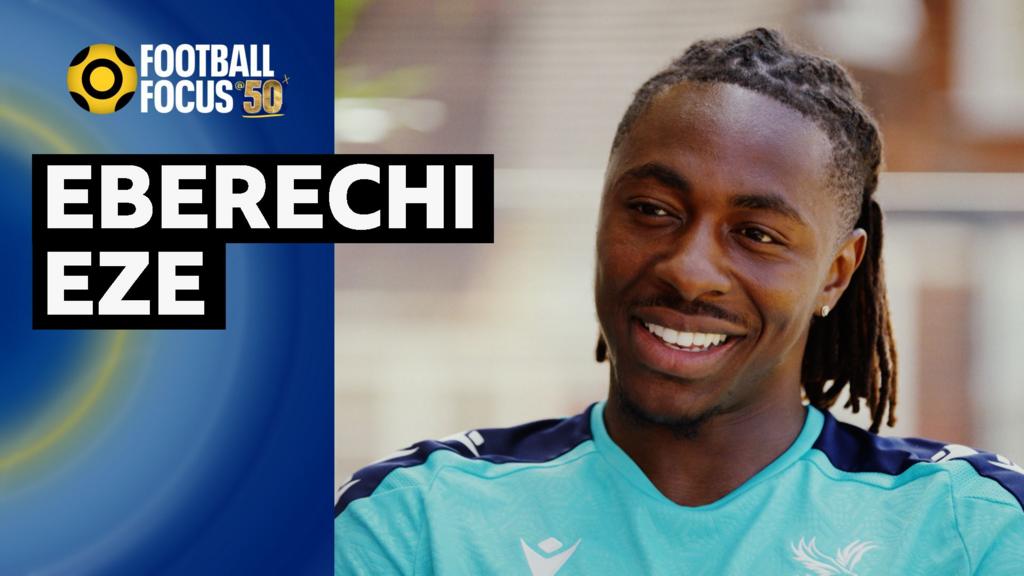Watch all the goals from Manchester City’s FA Cup journey before Saturday’s final at Wembley against Crystal Palace.
WATCH MORE: How Crystal Palace made it to the FA Cup final
Available to UK users only.

Watch all the goals from Manchester City’s FA Cup journey before Saturday’s final at Wembley against Crystal Palace.
WATCH MORE: How Crystal Palace made it to the FA Cup final
Available to UK users only.

Watch Crystal Palace’s journey from the third round through to the final of the FA Cup at Wembley against Manchester City.
WATCH MORE: How Man City made it to the FA Cup final
Available to UK users only.

A group of United States senators is trying to halt $3.5bn in weapons sales to the United Arab Emirates and Qatar over concerns that the deals will personally benefit the family of US President Donald Trump.
Two “resolutions of disapproval” were submitted on Thursday in the US by Democratic Senators Chris Murphy, Chris Van Hollen, Brian Schatz and Tim Kaine, along with Senator Bernie Sanders, an independent who often votes with Democrats.
The legislators also issued statements accusing President Trump, who is concluding a trip to the Middle East, of actively engaging in the “corruption of US foreign policy” over the timing of the sales and recent investment deals.
The Department of State this week approved the $1.6bn sale to the UAE of Chinook helicopters and equipment, F-16 aircraft components, and spare and repair parts to support Apache, Black Hawk and Chinook helicopters. Initial reporting cited the figure as close to $1.3bn, but the $1.6bn figure was used in a statement from the legislators. The lawmakers are also seeking to block $1.9bn in sales to Qatar of MQ-9B Predator drones and associated equipment, which was approved by the State Department in March.
The legislators accuse Trump of accepting favours in exchange for the deals, citing news from April that the Emirati investment firm MGX would use a stablecoin – a cryptocurrency whose value is pegged to another asset – issued by the Trump family-backed World Liberty Financial to finance a $2bn investment in the cryptocurrency exchange Binance.
The Trump family is reported to have made millions off niche cryptocurrencies like the $TRUMP “meme coin” since the president returned to the White House in January.
I know Trump’s crypto scams can seem hard to understand. So I went the Senate floor to break down the most outrageous one.
A foreign government is investing $2 billion in Trump’s coin to get favorable treatment from the Administration. A wild corruption.
Here’s how it works. pic.twitter.com/pxLSlZH2QN
In addition to business dealings, the senators also expressed fears that US weapons sent to the UAE could end up in the hands of Sudan’s paramilitary Rapid Support Forces, which is allegedly backed by the UAE and has played a critical role in Sudan’s civil war.
“The US should not be delivering weapons to the UAE as it aids and abets this humanitarian disaster and gross human rights violations,” Van Hollen said, citing Sudan’s civil war.
The senators also cited Qatar’s offer of a Boeing 747 jumbo for the president’s temporary use as Air Force One. The offer has drawn criticism from both Democrats and some Republicans because it would be the most expensive foreign gift ever exchanged between a foreign government and an elected US official.
“There’s nothing Donald Trump loves more than being treated like a king, and that’s exactly why foreign governments are trying to buy his favour with a luxury jumbo jet and investments in Trump’s crypto scams,” Murphy said in a statement.
When asked about the offer of the aircraft, Trump blamed Boeing’s lack of progress in building a new Air Force One and said he would be “stupid” to refuse a free plane.
“It’s not a gift to me, it’s a gift to the Department of Defense,” he said.

Scotland women’s cricket team were riding a high in December 2024. Just one month after their first appearance at a World Cup, they had been named as their nation’s team of the year.
Less than six months on, they have no fixtures scheduled.
Not one in the diary. In fact, they have not played at home since 2023.
“From a funding perspective, cricket costs so much to run. Our resources are extremely sparse – we’re almost running on fumes to try and have our women’s programme exist,” says director of performance Steve Snell.
“To host a series we’re looking at, give or take, between £75,000 and £100,000 and with very little kickback in terms of getting any money back in from that. If we do that three or four times a year against different teams, it gets expensive very quickly.”
The women’s game for associate countries, unlike Full Member nations like England, does not have a mandated Future Tours Programme that dictates when fixtures need to happen.
With teams having to organise things themselves, even if there is willing from touring countries, such as Pakistan, the prohibitive costs often make it impossible.
And for players such as wicketkeeper Sarah Bryce, the situation is a painful one: “Teams are wanting to play us now, which is really exciting, but we’re not able to.
“It’s just really frustrating because it’s difficult to know how we keep pushing forward as a team when we don’t have those opportunities to develop.”
“We feel pretty helpless. There’s not really much we can do about the situation if we don’t get the financial support that I think we deserve at this point,” agrees bowler Abtaha Maqsood.
Cricket Scotland receives approximately £1.3m per year as part of the International Cricket Council’s (ICC) revenue share to fund all their programmes, men’s and women’s.
The board has reportedly never made a profit.
Compare this with the England and Wales Cricket Board (ECB), which receives in excess of £30m from the ICC and has lucrative series for which to sell broadcast rights on an annual basis. The ECB’s latest accounts show a pre-tax profit of £27.9m.
More assistance could be offered from England with regular fixtures, says Snell.
The ECB says it does offer plenty of support, with a spokesperson saying: “We are happy to support the development of women’s cricket in Scotland and already organise fixtures at a pathway level, including inviting Scotland Women’s under-19s to play in the School Games last year, while England Women’s under-19s will play a number of fixtures against Scotland A this summer.”
But is it enough to only offer support at only junior levels?
“These Full Member nations need to help out the associate members a little bit more and try their best to host us whenever they can because it’s clearly not really coming from the ICC,” says Maqsood.
The ECB says that it is far from being that simple, though: “The priority for England Women has to be scheduling series against ICC Full Members which fulfil our obligations within the ICC’s Future Tours Programme and set the team up for success in global tournaments and marquee series like the Women’s Ashes.”
For Bryce, the need to grow the game should not be seen as purely altruistic, but rather an opportunity to help cricket become a successful sport more widely: “We don’t want it to just be India, Australia and England as the only top three teams competing. I think it’s much more exciting when those World Cups are competitive.”
It has long been an issue for the game that qualifying tournaments for major events are organised late, meaning many of Scotland’s players who are on one-day-per-week contracts have to rearrange life at the last minute to attend.
“We are getting very, very last-minute information about tournaments. And when we’ve got limited funding, it makes planning very difficult. Even four weeks before the tournament in Pakistan with the Women’s World Cup Qualifier, we had scant information about what was happening,” says Snell.
From a player welfare perspective, this is also far from ideal according to Bryce: “It’s okay if it happens once every now and again, but when that’s every tour, it’s so challenging and different people’s workplaces are like: ‘You need to give us more notice’.”
Cricket in the United Kingdom is not short of money – just look at the close to £1bn valuation for the eight franchise teams in The Hundred. According to Snell, it would not take much to make a huge difference.

Scotland women’s cricket team were riding a high in December 2024. Just one month after their first appearance at a World Cup, they had been named as their nation’s team of the year.
Less than six months on, they have no fixtures scheduled.
Not one in the diary. In fact, they have not played at home since 2023.
“From a funding perspective, cricket costs so much to run. Our resources are extremely sparse – we’re almost running on fumes to try and have our women’s programme exist,” says director of performance Steve Snell.
“To host a series we’re looking at, give or take, between £75,000 and £100,000 and with very little kickback in terms of getting any money back in from that. If we do that three or four times a year against different teams, it gets expensive very quickly.”
The women’s game for associate countries, unlike Full Member nations like England, does not have a mandated Future Tours Programme that dictates when fixtures need to happen.
With teams having to organise things themselves, even if there is willing from touring countries, such as Pakistan, the prohibitive costs often make it impossible.
And for players such as wicketkeeper Sarah Bryce, the situation is a painful one: “Teams are wanting to play us now, which is really exciting, but we’re not able to.
“It’s just really frustrating because it’s difficult to know how we keep pushing forward as a team when we don’t have those opportunities to develop.”
“We feel pretty helpless. There’s not really much we can do about the situation if we don’t get the financial support that I think we deserve at this point,” agrees bowler Abtaha Maqsood.
Cricket Scotland receives approximately £1.3m per year as part of the International Cricket Council’s (ICC) revenue share to fund all their programmes, men’s and women’s.
The board has reportedly never made a profit.
Compare this with the England and Wales Cricket Board (ECB), which receives in excess of £30m from the ICC and has lucrative series for which to sell broadcast rights on an annual basis. The ECB’s latest accounts show a pre-tax profit of £27.9m.
More assistance could be offered from England with regular fixtures, says Snell.
The ECB says it does offer plenty of support, with a spokesperson saying: “We are happy to support the development of women’s cricket in Scotland and already organise fixtures at a pathway level, including inviting Scotland Women’s under-19s to play in the School Games last year, while England Women’s under-19s will play a number of fixtures against Scotland A this summer.”
But is it enough to only offer support at only junior levels?
“These Full Member nations need to help out the associate members a little bit more and try their best to host us whenever they can because it’s clearly not really coming from the ICC,” says Maqsood.
The ECB says that it is far from being that simple, though: “The priority for England Women has to be scheduling series against ICC Full Members which fulfil our obligations within the ICC’s Future Tours Programme and set the team up for success in global tournaments and marquee series like the Women’s Ashes.”
For Bryce, the need to grow the game should not be seen as purely altruistic, but rather an opportunity to help cricket become a successful sport more widely: “We don’t want it to just be India, Australia and England as the only top three teams competing. I think it’s much more exciting when those World Cups are competitive.”
It has long been an issue for the game that qualifying tournaments for major events are organised late, meaning many of Scotland’s players who are on one-day-per-week contracts have to rearrange life at the last minute to attend.
“We are getting very, very last-minute information about tournaments. And when we’ve got limited funding, it makes planning very difficult. Even four weeks before the tournament in Pakistan with the Women’s World Cup Qualifier, we had scant information about what was happening,” says Snell.
From a player welfare perspective, this is also far from ideal according to Bryce: “It’s okay if it happens once every now and again, but when that’s every tour, it’s so challenging and different people’s workplaces are like: ‘You need to give us more notice’.”
Cricket in the United Kingdom is not short of money – just look at the close to £1bn valuation for the eight franchise teams in The Hundred. According to Snell, it would not take much to make a huge difference.

Crystal Palace and England midfielder Eberechi Eze talks to former Eagles striker Glenn Murray about his style of play as he prepares for Saturday’s FA Cup final against Manchester City.
Watch Football Focus on Saturday at 12:00 BST on BBC One, BBC iPlayer, the BBC Sport website and app.